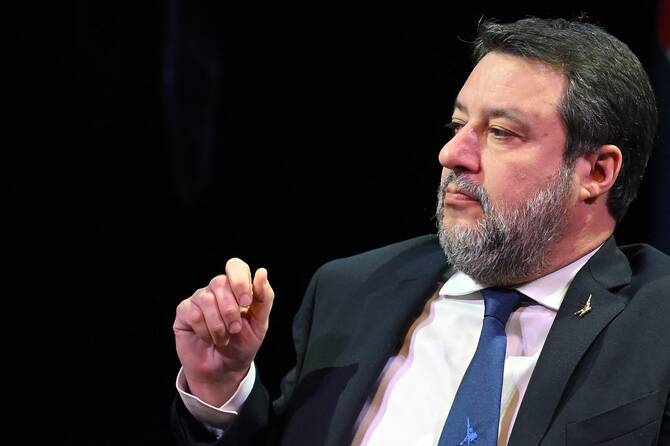LONDON: Italy’s far-right League party has been referred to the country’s communications watchdog after opposition parties filed a complaint over “racist, Islamophobic and xenophobic” images generated by artificial intelligence and shared on social media by deputy prime minister and party leader Matteo Salvini.
The complaint was submitted to Agcom, Italy’s communications regulatory authority, on Thursday by the center-left Democratic Party, along with the Greens and Left Alliance. It alleges the images published by the League contained “almost all categories of hate speech,” according to The Guardian, which first reported the story.
“In the images published by Salvini’s party and generated by AI there are almost all categories of hate speech, from racism and xenophobia to Islamophobia. They are using AI to target specific categories of people — immigrants, Arabs — who are portrayed as potential criminals, thieves and rapists,” said Antonio Nicita, a PD senator.
Nicita also criticized the decision to blur the faces of the supposed victims, calling it “deceptive” and accusing the League of intentionally misleading users into believing the images were real.
Emilio Borrelli, an MP with the Greens and Left Alliance, said the images were “part of their strategy to create fear among citizens” and “incite hate.”

One of the posts published by The League's X/Twitter account reads: “Reggio Emilia, forced with beating to put on the islamic veil and to give up school and friends.”
Over the past month, dozens of apparently AI-generated images have been posted across the League’s social media channels, including Facebook, Instagram and X. Many depict men of colour, often armed with knives, attacking women or police officers.
A spokesperson for Salvini’s party confirmed some of the pictures were digitally generated but insisted: “The point is not the image. The point is the fact,” adding the posts were “based on true reports from Italian newspapers.”
However, AI forensic experts have stated all the images in question bore clear signs of being artificially generated. They also noted that while platforms are required to label AI-generated content, in most cases automatic detection tools failed to do so.
In one of the posts cited in the complaint, a mother and father in Islamic dress appear to be shouting angrily at a young girl — a portrayal the complainants say fuels racial and Islamophobic stereotypes. The newspaper cited in the post, Il Giorno, makes no reference to the family’s religion and does not include any photographs. The only detail given was that the child had attended Arabic language classes.
As The Guardian reported, the use of AI-generated imagery by far-right parties across Europe has surged in recent months. The targets are often refugees from conflict zones such as Syria, Sudan and sub-Saharan Africa, as well as people from other minority backgrounds. These depictions frequently invoke the debunked “Great Replacement” conspiracy theory, which falsely claims that immigration is part of a plot to erode European identity and culture.

In another post, the party used AI to generate an image captioned: “Yet another Euro-madness. The EU spends ten million for the “European Quran’ project.” The caption referred to an EU-funded research project examining the Quran’s religious, intellectual, and cultural impact in Europe from the 12th to the 19th century.
Salvini, who has capitalized on rising refugee arrivals in Europe to maintain a prominent role in Italian politics and advocate for stricter immigration policies, has frequently made headlines for inflammatory remarks, including calling immigrants — often men — “dogs and pigs.” In late 2024, he was acquitted of charges of kidnapping and dereliction of duty after judges ruled that the evidence presented by prosecutors was insufficient to convict him. The case stemmed from a 2019 incident in which Salvini, then interior minister, refused to allow a Spanish migrant rescue ship to dock in an Italian port, leaving those on board stranded at sea for 19 days.
Asked whether the League was aware the images could incite hate, a party spokesperson said: “We are sorry, but our solidarity goes to the victims, not the perpetrators. If denouncing crimes committed by foreigners means ‘xenophobia’, perhaps the problem is not the word but those who use it to censor debate. We will continue to denounce, with strong words and images, what others prefer to ignore.’’
If Agcom finds the League’s content in violation of regulations, it could act under the EU’s Digital Services Act, which allows it to order the removal of posts, shut down accounts or impose fines on social media platforms for failing to moderate harmful content.
















